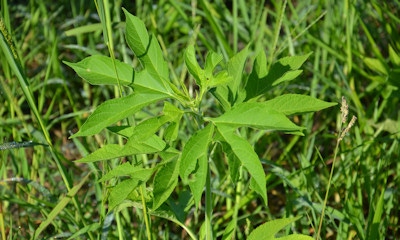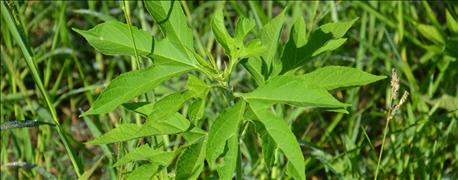
You can’t go to a weed control meeting or read an article about weed control without hearing about resistant weeds. And rightfully so - development of resistant weeds has caused a shift from cheap, convenient, pour-glyphosate-in-the tank weed control back to spraying residual herbicides with different modes of action.
However, Fred Whitford, Director of Purdue University Pesticide Programs, who works with Bryan Young, Purdue weed control specialist, says that just because you haven’t gotten the degree of weed control you want doesn’t automatically mean weeds are resistant. There may be other factors affecting whether or not you burn back weeds, kill them, or just make them mad.

RESISTANT WEED OR POOR PERFORMANCE? This weed didn’t die after application. Is it resistant to the herbicides applied, or did hard water tie up so much active ingredient that there wasn’t enough left to work on the weed?
“One of the major things we’re emphasizing is quality of the spray water,” Whitford says. “A significant amount of the active ingredient could be getting tied up with minerals and not available to kill weeds if your water is hard and you’re not doing anything about it. The pH of the spray solution is a separate issue which could also impact how well a product performs.”
Here ae five questions to ask yourself before just concluding all your weed battles are due to resistant weeds.
1. Have you tested your water for hardness?
“Most water in Indiana is hard,” Whitford says. “Calcium and magnesium have positive charges. They tie up the negative charged- active ingredients in some cases. Once they do the herbicide will be less effective.”
2. Is glyphosate the only product affected by hard water?
No, but it is the classic one, Whitford explains. That’s why you hear a lot about it. However, other products can be affected by hard water too.
3. What will happen if the water I fill the sprayer with is hard?
“Basically you are diluting the herbicide,” Whitford says. “Because a large amount of the active ingredient is tied up, there isn’t as much left to work inside the plant. If you’re dealing with a weed that is tough for that herbicide to control anyway, even if it isn’t resistant, the weed plant may not be seeing a high enough rate of active ingredient to kill it.”
4. Even if I correct water hardness, there is no guarantee I will get good control, is there?
“No, there are no guarantees,” Whitford says. “But if you correct hardness and also know that the spray solution is at the pH recommended by the manufacturer, and you spray correctly, then you at least know poor control likely isn’t due to water issues.”
5. You say pH is important too. Should I test pH of my spray water or of the spray solution?
“You can test the pH of the water so you know about what you have. Most water in Indiana is alkaline. But what really counts is pH of the solution. That’s what the herbicide works in, and what the weed will see when droplets land on it.”
About the Author(s)
You May Also Like




